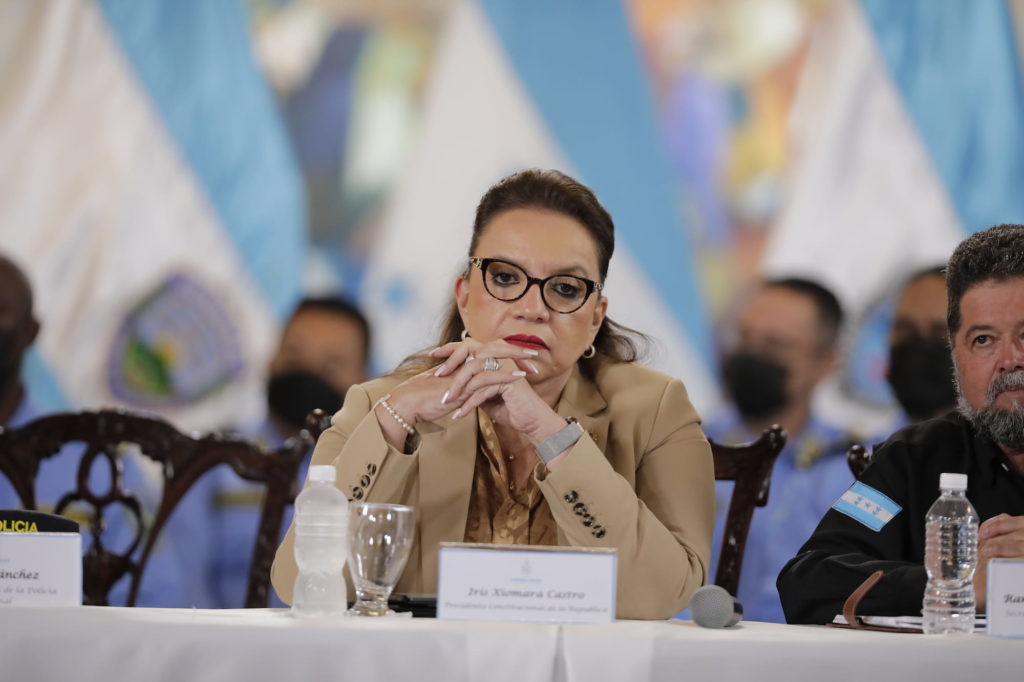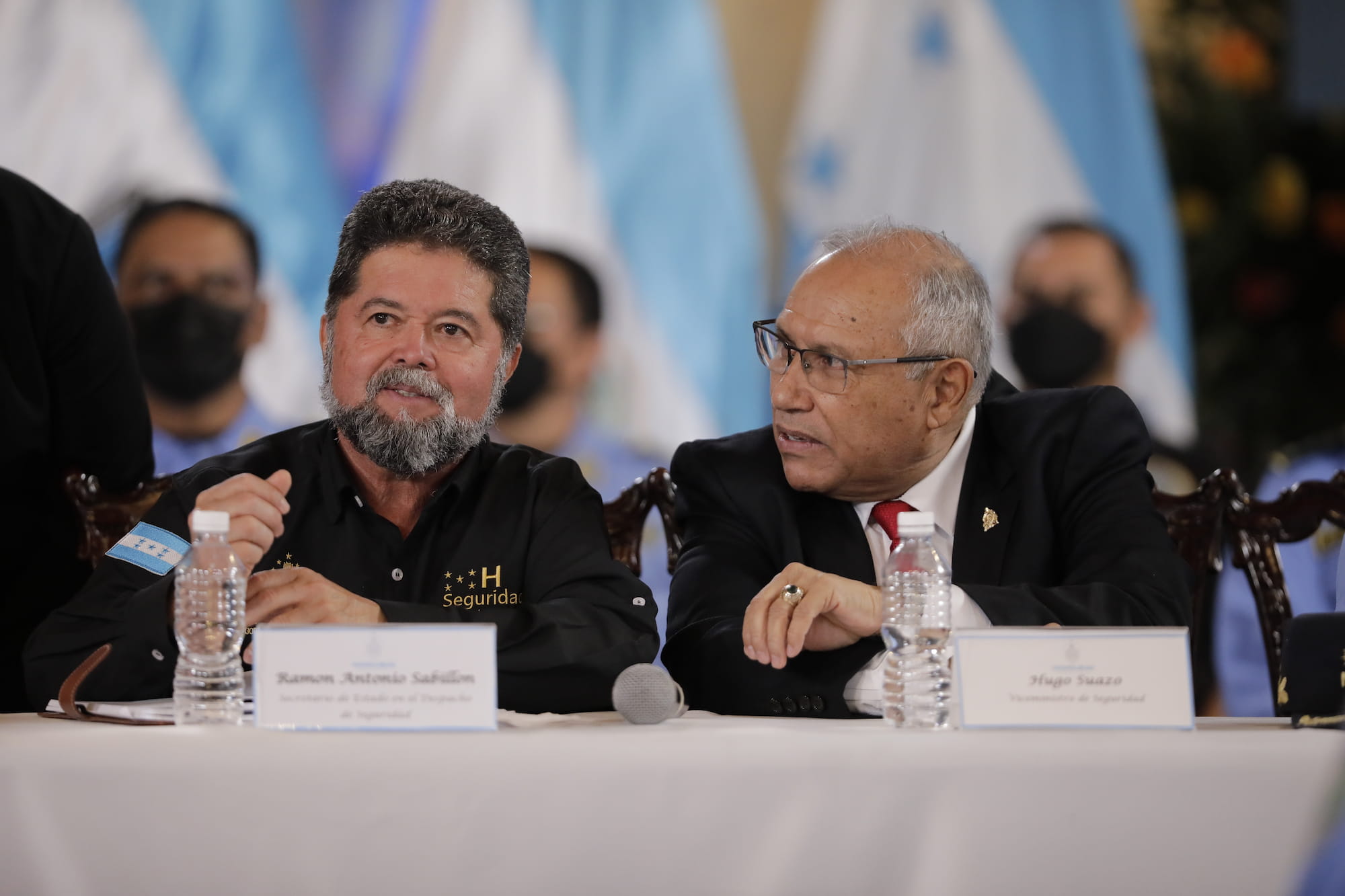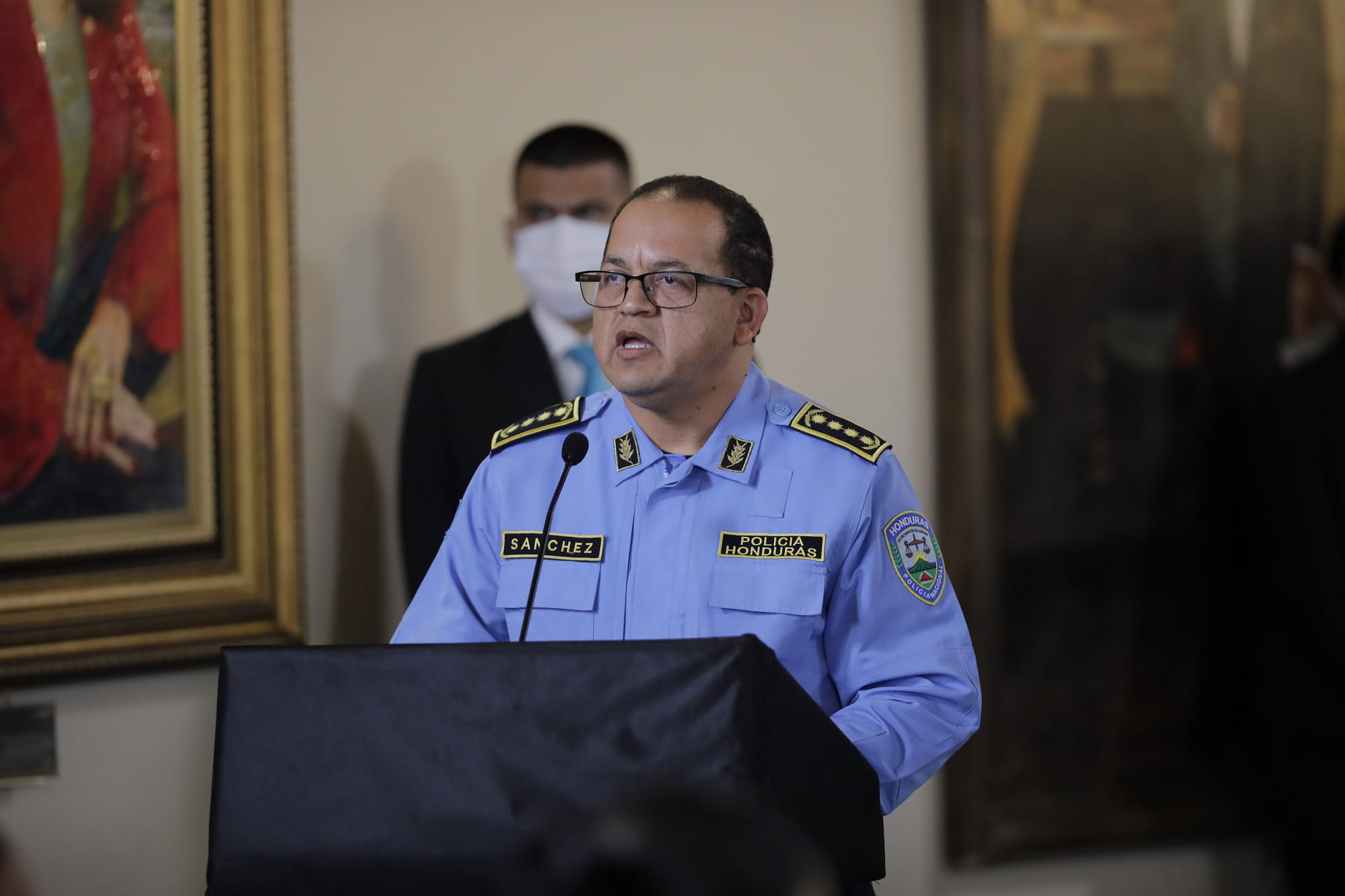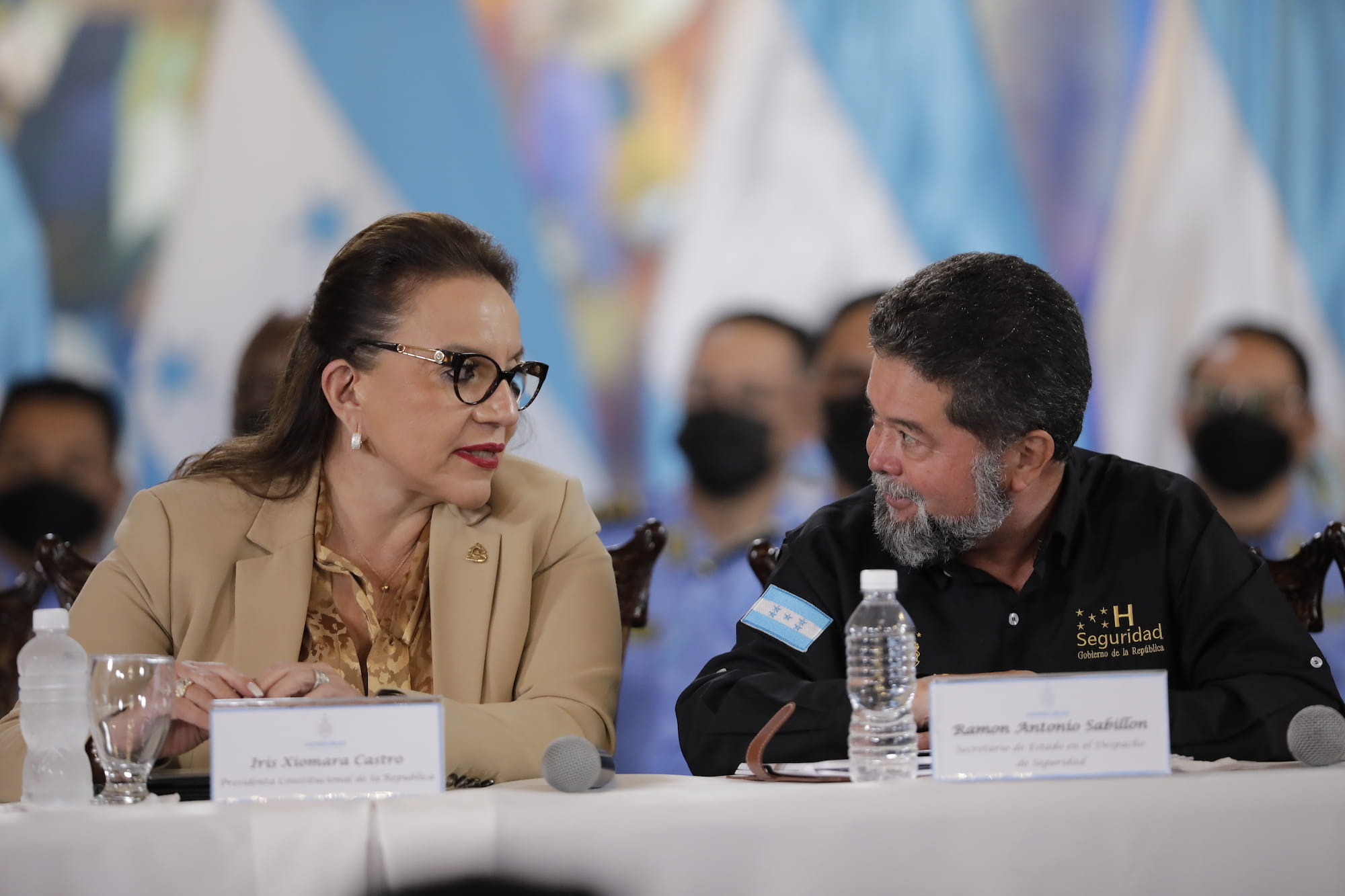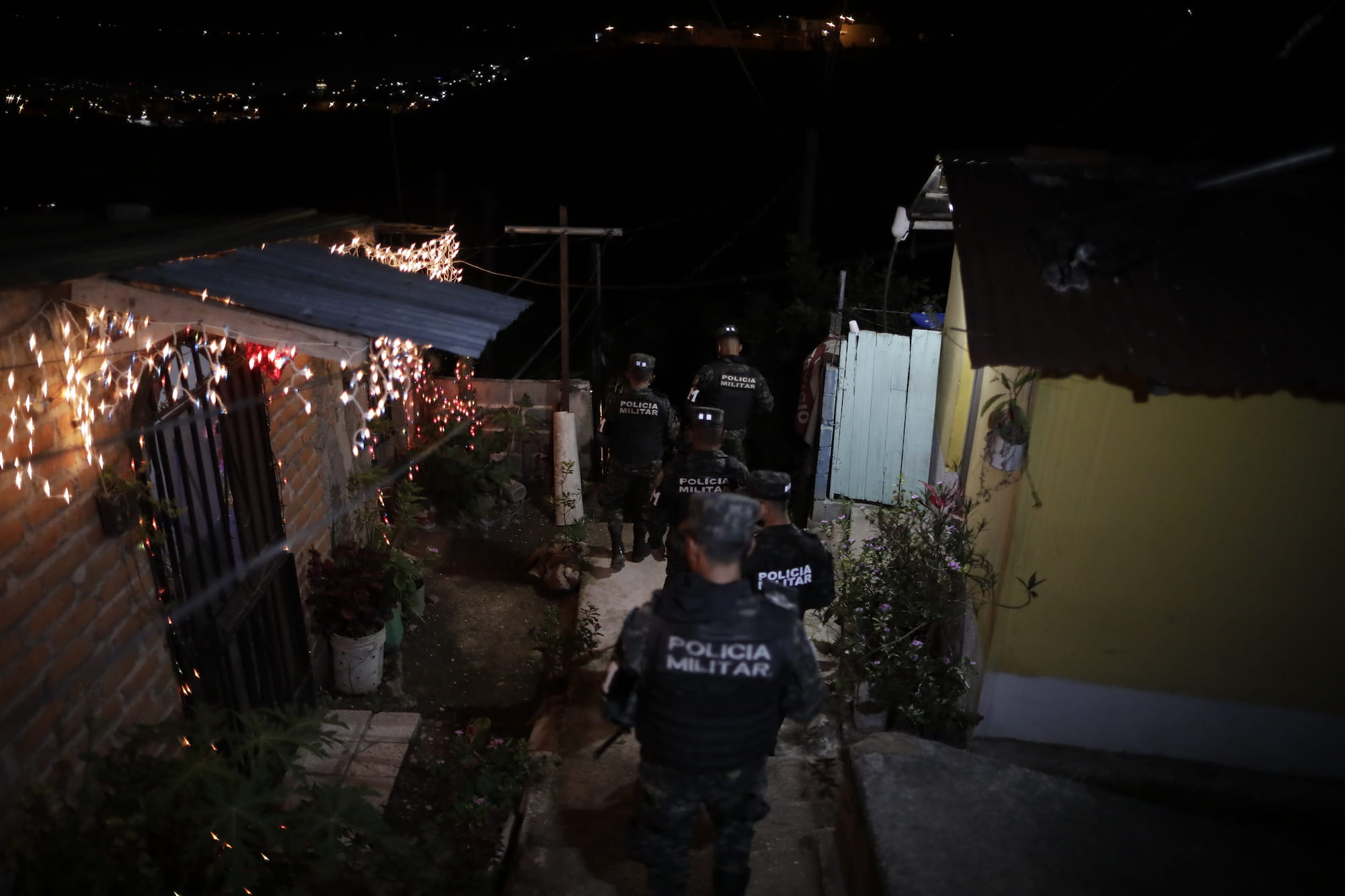With the launch of the ‘Comprehensive Plan To Address Extortion and Related Crimes’, the Honduran government appears to be imitating neighboring El Salvador’s ‘Territorial Control Plan’, under which the Salvadoran government claims to have captured some 56,000 gang members.
Text: Leonardo Aguilar
Photographs: Jorge Cabrera
Last Thursday, the government of Honduras launched the Comprehensive Plan To Address Extortion and Related Crimes, with which it declared a “national security emergency”.
The issue of extortion seems to have become fashionable with the government of Xiomara Castro in recent months even as, according to reliable studies published between March and April of this year 2022 – among these the survey of the Reflection, Research and Communication Team (Equipo de Reflexión, Investigación y Comunicación – ERIC), Honduran citizens do not see extortion as the main threat to the country, nor is eradicating extortion a primary demand.
In the ERIC report, citizens placed their demands on the Honduran government in the following order of priority: ‘improve [the country’s] economic situation’, ‘generate sources of employment’, and ‘combat crime and insecurity’.
In April of this year, the ERIC survey placed “robbery without aggression (46%)”, “robbery with aggression (23%)” and “murder (12%)” as the crimes most suffered by the population, while the crime of “extortion”, also known in Honduras as “war tax”, registered only 3.5%.
Still, reports of extortion have increased substantially in the last months, hitting the image of Xiomara Castro’s government hard. Last November 14, Mateo Yibrin, president of the Honduran Council of Private Enterprise (Consejo Hondureño de la Empresa Privada – COHEP), stated that extortion “was getting out of hand” in Honduras and that this crime generated “10% of forced displacement”.
The plan announced last Thursday, November 24 by Xiomara Castro includes the suspension of constitutional guarantees in areas with the highest rates of violence. She said that 19,471 police agents will be deployed to carry out patrols, maintain safe areas during Christmas and control security in high risk areas.
An important part of the strategy is the ‘Plan Escorpión’ which, according to the government, is aimed at controlling organized crime and gangs.
Otto Argueta, a Guatemalan historian and doctor in Political Science, explained to Contracorriente that in Central America, and especially related to Bukele’s actions in El Salvador, states act under the assumption that violence occurs “in a certain place” and it is in that place that “there are the aggressors”.
In such a way, Argueta said that states [form] general profiles [of criminals] without holding corresponding individualized investigations. Therefore when the arrests reach the courts, “there is no evidence and they [the arrested] all end up released.”
Argueta also explains that to approve these states of exception they resort to “moral panic”, which is propitiated when a country is facing a crisis, and that crisis is taken advantage of because it represents a fear in which all people agree, and when you have that figure, that fear, which is collectively accepted, “there are the causes of all the problems of a country”.
For Argueta, governments resort to “moral panic” in order to get states of exception approved. Moral panic is propitiated when a country is facing a crisis, and that crisis is taken advantage of because it represents a collective fear and, when you have that fear, “there are the causes of all the problems of a country”.
All people can agree on the fear of “gangs and extortion,” said Argueta. Within this fear, “whatever is done [to address it] is welcome.” People “agree that they [gangs and extortion] are the cause of all people’s problems, although we know that is not the case.”
Once this fear is agreed on, “any action taken” against the labeled ‘criminals’ will be welcomed and celebrated, Argueta explained. This is called moral panic – evidenced when society does not question an action if that action alludes to a fear that is collectively accepted.
Argueta noted that this approach “has already been proven not to work” in Central America.
“Everything we are seeing has already been done by past governments, under different names.”
“States of exception, the excessive use of repression, militarization of public security, mass incarceration and targeting specific territories, the removal of citizen guarantees … this has been done since the 2000s and [it] has not been able to prevent the existence of all these cycles of urban violence in these countries.”
As President Nayib Bukele did in El Salvador, President Xiomara Castro assured Honduran citizens that the “national security emergency” is a strategy that seeks the immediate recovery of territories in the country that are currently “lawless,” “in neighborhoods and colonias, in the villages, in the municipalities, in the departamentos”.
The plan allows the government extraordinary access to public resources in order to implement the new project and combat gangs of extortionists, hired assassins, drug traffickers and kidnappers.
In the last few days in Honduras, there have been protests and vocal complaints from the business sector, transportation companies, citizens, and NGOs, among others who blame the Mara Salvatrucha MS-13 and Pandilla 18 for controlling extortion from the prisons.
Tiziano Breda, analyst for Central America at the International Crisis Group, told Contracorriente that, if seen from a general perspective, the Honduran government’s plan looks positive. This is because it changes the strategy for the prosecution of “extortion collectors” and focuses more on how to follow the money trail and investigate where it will end up in terms of money laundering, “to get to the clients of the crime of extortion”.
However, the analyst has doubts about how the Honduran government will be able to afford the plan: “I am not sure, it seems to me that they only have about 1000 million lempiras to implement this plan, so it clashes with a reality where there may not be enough resources”.
Otto Argueta, for his part, maintains that these models rely on the operation of a very large propaganda machine to show the government is taking action and, after the suspension of rights guarantees, the suspension of bureaucratic processes for the acquisition of resources also comes into play.
“The declaration of emergency also implies that funds can be made available on an emergency basis, so there are no [typical government procedures], they are suspended and that has given rise to corruption,” he said.
Tiziano Breda, for his part, notes that the very capacity of the National Police has been very weakened in recent years. He said the National Police still has high corruption rates – now, as they are being given a leading role and are replacing the military forces, “I am not sure that it is prepared to implement it”.
The analyst pointed out that Xiomara Castro’s plan has priors: “she is surely looking at what is happening in terms of security in neighboring countries, no doubt [including] the strategy implemented in El Salvador”.
Having researched the state of emergency in El Salvador over the past eight months, Breda notes two aspects of that model that may have gained the interest of the Castro government.
The first is that it has been a state of emergency on a national scale, as opposed to focusing on a particular territory within the nation.
As a national state of emergency, the El Salvador policy has “managed to speed up the processes of detention and incarceration, with prosecution of many criminals.”
As such, “it has managed to dismantle many gang operations, at least temporarily.”
There are some places where people had been paying extortion for decades who now feel some respite, notes Breda.
The second element is that it is an extremely popular and welcome measure in El Salvador. Castro’s government is under pressure “to address the issue of extortion and the … perception of insecurity” and “the proposal to impose a state of exception responds to these two matters.”
Gustavo Sánchez, Director of the National Police, said that this launch is part of the government’s ‘refoundation’ plans for Honduras. He said that his organization is on the right track because in the 10 months of management, they have managed to reduce homicides, apprehend people for extradition, eradicate cocaine plants, dismantle 291 gangs and capture 1,234 gang members.
The government media has deployed a narrative aimed at spreading the word that President Castro has declared war on extortion with the support of the Minister of Security, Ramón Sabillón. The two have been giving press appearances stating that extortion has been increasing in the country for several decades.
State of exception sponsored by the National Police
Honduran lawyer Juan Carlos Barrientos, an expert in constitutional law, told Contracorriente that, while President Castro said in her speech that the police would be in charge of determining the states of exception, this is not in fact possible under the law.
“The Constitution of the Republic establishes that the suspension of guarantees and rights at the national level is declared by the President in the Council of Ministers,” explained Barrientos. “The President cannot give that power to the Police to declare a state of exception, it seems to me that it must have been a misunderstanding.”
Barrientos added that a state of exception, which he defines as “something out of the ordinary”, implies the suspension of constitutional guarantees and where generally the guarantees of personal liberty, search and seizure and those related to criminal matters are suspended.
A contributor to public opinion on Honduran constitutional matters, Barrientos says that, constitutionally, El Salvador has done things well.
“It seems to me that the best thing that could have been done was done in El Salvador,” he said.
“They suspended some constitutional guarantees through Congress and they went into full force to capture all the gang members, to prosecute them; they made reforms to the penal codes, and reforms to all kinds of laws such as those [related to] children and adolescents, so that the capture and prosecution of these people could be carried out in a prompt, expeditious and mass manner”.
When consulted about the state of exception put in place during Covid, Barrientos explained that there both similarities and difference between he national state of exception just declared by President Castro due to extortion and the states of exception already in place in Honduras due to the covid19 pandemic.
“They are similar [state of exception for Covid-19 and state of exception for anti-extortion], with the difference that here [the state of exception for anti-extortion] there are also implicit reforms to the Penal Code and the Penal Procedural Code and so that judges do not let gang members go free,” the lawyer explained.
“The reforms are to increase the penalties, to establish conditions in which the offender is not only the young guy who goes around collecting the extortion, but also the ringleaders – those who have the bank account where the deposits are made,” the expert explained.
“They are even asking for reforms to the national commission of banks, so that electronic transfers can be investigated, et cetera.”
On the other hand, Barrientos acknowledged that the Honduran National Police has always had problems with members being involved in organized crime. “That is an open secret, no one can ignore that, and not just now, remember the previous government.”
Commissioner Sánchez, director of the Police, explained that his institution will execute a ‘safe markets plan’ along with the ‘Plan Escorpión’, focused on the border of Honduras with El Salvador. He said the territorial security control plan will be extended in risk areas and articulated with local governments, giving examples such as the municipalities of Villanueva and Lepaterique which are already carrying out curfews.
Honduras has announced that it will focus and rely on intelligence, investigation and accumulation reports and that it will carry out the financial investigation of persons accused of extortion through the criminal prosecution bodies. It will also thusly combat money laundering crimes through foreclosure of assets and will also make use of the National Banking and Insurance Commission (Comisión Nacional de Bancos y Seguros – CNBS) where it will be necessary to create the financial registry and patrimonial financial units, respectively.
Sánchez stated that the sale of telephone chips must be controlled and motorcyclists must be controlled by means of a vehicle registration system in which stickers with the license plate number will be placed on helmets and vests.
The police chief also said that it is necessary to reform articles 373 and 374 of the Penal Code, as well as article 237 of the Penal Procedural Code and articles 26 and 29 of decree 93-2021.
Will the state of exception do for Castro what it did for Bukele?
On the possible success of the plan in Honduras and the similarities of the violence faced by the governments of Guatemala and El Salvador, Tiziano Breda makes a distinction, not only between Honduras and El Salvador but also with what happens in Guatemala.
“Guatemala has some very specific characteristics,” he said. “The presence of gangs is a little more concentrated in the big cities, it is more similar to Honduras in the sense that there are also other criminal groups of drug traffickers, gangs of car thieves, etc.”
Breda believes it is difficult for Honduras to fully replicate what is happening in El Salvador, first, because Bukele made it possible for these measures to be implemented and extended eight times while the policy “is being complied with without major resistance from any state body: it is constitutional and the prosecutors agree to judge people with weak evidence.”
That is, “this is only possible with the control that Nayib Bukele has in the different state institutions.”
“In Honduras, so far, President Xiomara Castro does not have that level of control over the judiciary and the legislature”.
Breda also observes that, in El Salvador, “they are operating on a database profiling gang members, where the majority, or a good part of the gang members are already profiled in the databases or the police already know where they are, who they are, etc.”
“I am not aware that there is such a detailed exercise in Honduras, although the profiles of leaders are known, I do not know if they have a database as extensive as the one in El Salvador”.
Breda also addressed the issue of Honduras’ capacities and infrastructure:
“We have to start from the capacity to operate throughout national territory, to carry out massive raids.”
“In El Salvador there are, if I am not mistaken, between 40,000 to 45,000 police and military involved in public security tasks,” continued Breda. By contrast, “in Honduras there are about 38 thousand police and military in a country that is much larger than El Salvador.”
Further, “El Salvador which has about 18 thousand [police] agents.”
As such, Breda said he sees it being difficult for Honduras to apply the same measures on a national scale.
“In fact President Castro said that it would be more of a localized exercise”, the analyst observed.
Can the troubled Honduran prison system accommodate mass imprisonment?
Breda said that the suspensions of constitutional guarantees under the state of exception could create the environment for a series of abuses, where people arrested and detained would be left unprotected.
If, “as has been done in El Salvador,” raids and mass arrests result in mass incarceration, “we must also take into account the consequences regarding prisons.”
“There are more than 58 thousand captured in El Salvador so far… Honduras already has more than 20 thousand prisoners in the system, which if I am not wrong, has a capacity for only 8 thousand … imagine what could happen with a campaign of mass arrests?”
A report by the Inter-American Commission on Human Rights (IACHR), published in August 2019, indicated that the occupation rate of penitentiary centers in Honduras – with a capacity to house 10,814 people – exceeded almost twice their actual housing capacity, with a rate of 88% overcrowding. The National Penitentiary Institute (INP) reported in July 2018 that there were a total of 20,356 persons in prison in Honduras across 29 detention centers, including three that operate inside three military battalions.
Another study by the Office of the High Commissioner for Human Rights (OHCHR), published in 2021, establishes that, according to INP data, the Penitentiary System houses 20,687 adult detainees, although it only has the capacity to receive 14,780 people, which represents an overpopulation of almost 40%.
Honduras is a country with evident rates of impunity and lack of investigation: “Around 51% of the prison population does not have a sentence. The excessive use of pretrial detention, despite its exceptional nature according to the law, continues to be a major challenge for the decongestion of the prison system,” says the OHCHR.
On February 25, President Xiomara Castro announced a process in which command of the penitentiary system would transfer to the National Police. The process is intended to conclude in the formation of a Penitentiary Police force, independent of the Armed Forces and the National Police, and supported by a Community Police force.
Otto Argueta agrees with Tiziano Breda that the Honduran police forces have an extremely large deficit. “That was the reason why they were trying to incorporate purged policemen in their ranks.”
The stability of numbers entering and exiting that characterizes some other police forces is not present in Honduras, where “many people leave and few people enter.”
Argueta says there is “very little professionalism” within the Honduran police.
“Right now there has been a lot of propaganda to present [the National Police] as a very violent force with the idea that it is not going to be defeated by crime, [in contrast to] the recently created Community Police”.
For a community policing model to succeed, Argueta says, “a state of emergency is the opposite” of what is required. A state of emergency, he continued, “is going to damage the social fabric, it is going to impose fear, it is going to generate distrust.”
Further, “these things [states of emergency] are usually short-term – you go to a place, you saturate it, you do operations.”
“If what they [the Honduran government] want is the El Salvador model, they will have to do what Bukele did, that is, extend a period of exception for several months and violate many human rights, as is being done in El Salvador.”
Although in a press conference it was stated that the military and the Public Order Military Police (Policía Militar del Orden Público – PMOP) will guard the borders, these uniforms continue to carry out public security operations elsewhere. The PMOP carried out operations this Thursday in sectors considered violent in Tegucigalpa, among them the Villa Nueva neighborhood. They are also present in other violent sectors of the capital and in San Pedro Sula.
Colonel Eduard Suazo, commander of the fifth battalion of the PMOP, assured Contracorriente that “as the President has already said, the PMOP is participating in different operations, both in patrols and checkpoints in the violent sectors of the capital and we are also doing so in other sectors of the country”.
So far, the Comprehensive Plan To Address Extortion and Related Crimes has not been published in the Portal of Access to Public Information.

